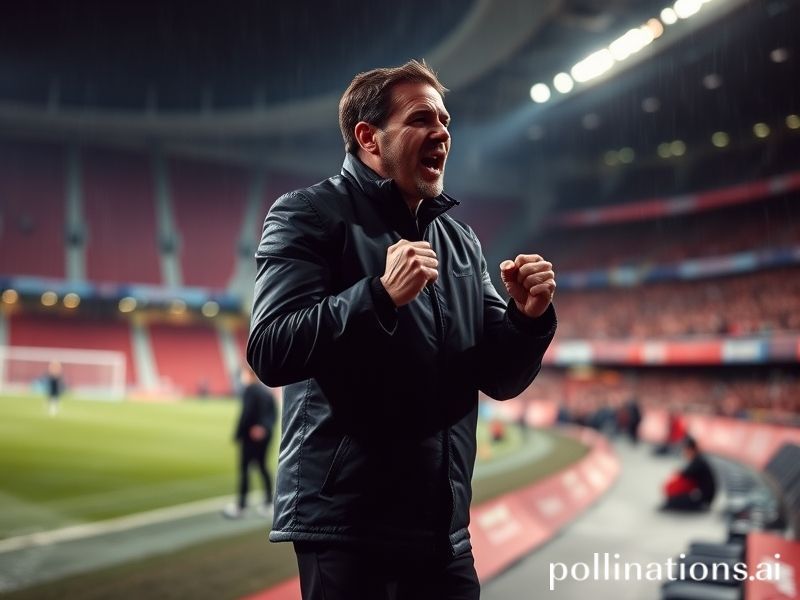Simeone’s 12-Year War: How Atlético’s Tyrant of the Touchline Outlasted Empires and Outraged Europe
MADRID – Walk the worn marble of the Manzanares at dusk and you will find the last dictator Europe still applauds. No, not one of those tin-pot nostalgics hogging the headlines in the world’s sad corners—this one wears a black Armani tracksuit, whistles with the authority of a frontier guard, and has turned a modest Spanish club into a geopolitical spoiler. Diego Pablo Simeone, 53, has now ruled Atlético Madrid for 12 years, a longevity that mocks the continent’s revolving-door politics, Silicon-Valley attention spans, and your landlord’s annual rent hike. In an age when managers last about as long as a TikTok trend, Cholo’s reign is a middle finger to the doctrine of planned obsolescence—an artisanal South-American middle finger, hand-carved and aimed at the ghost of neoliberal efficiency.
Globally, the implications are deliciously perverse. While super-clubs leverage petro-dollars, crypto-scams, and nation-state PR budgets, Atlético have prospered by weaponizing the oldest currency of all: spite. Simeone’s roster of rejects, late bloomers, and glorious head-cases keeps gate-crushing UEFA’s gala, like uninvited cousins who drink the open bar dry and leave with the silverware. Twice they’ve pilfered La Liga from Barcelona and Real Madrid, the footballing equivalents of Apple and Google, proving that even in our winner-take-all dystopia, a well-organized guerrilla cell can still hijack the supply truck.
Watch Atlético on a counterattack and you witness the strategic patience of sanctions evasion: sit deep, absorb, wait for the global hegemon to overextend, then hit the shipping lane when the satellites blink. Simeone didn’t invent this style—catenaccio, Helenio Herrera, and your college boyfriend’s emotional unavailability got there first—but he industrialized it for the Champions-League era, forged it into a brand identity, and slapped a price tag on the trauma. Corporations pay consultants millions for that sort of coherence; Atlético get it from an Argentine who looks like he hasn’t slept since the 1990 World Cup.
The world should pay attention, because Simeone offers a blueprint for underdogs everywhere. Facing climate collapse? Parking the bus might be greener than flying full-backs forward every three minutes. Wrestling with inflation? Teach your workforce to defend in two compact banks of four and watch discretionary spending plummet. The man’s tactical conservatism is basically a self-help seminar for failing states: minimize risk, maximize set pieces, and never trust the lottery of open play—advice the IMF could fax to half a dozen capitals before breakfast.
Europe, of course, pretends to hate this sort of thing. Continental pundits bemoan the “death of beauty,” as if football’s purpose were to serenade them personally rather than, say, pay wages and service debt. Yet every February the same commentators jostle for interview slots in the Metropolitano media room, secretly hoping the underdog eats another darling. Hypocrisy is the continent’s second language, right after the one it uses to lecture everyone else about human rights while signing gas deals.
Across the Atlantic, Latin America views Simeone as a psychological export, proof that the region can still weaponize trauma for profit. When River Plate’s ultras sing his name, they aren’t just nostalgic; they’re claiming royalties on every European night he ruins. Asia’s booming betting markets love him for the simple reason that 1-0 is easier to forecast than 4-3, and in economies addicted to algorithmic certainty, a coach who turns games into calculus homework is basically a public utility.
Even the United States, where soccer is usually background noise for artisanal coffee ads, has noticed. MLS academies now teach “Simeone principles,” which sounds like a wellness cult but mostly means running until your lungs file for divorce. In a country that worships process over poetry, Cholo’s militarized drill sessions fit like avocado on sourdough. Expect an expansion franchise called “Atleti Austin” by 2030, complete with artisanal suffering and a craft-beer terrace that only serves 1-0 lagers.
And so the reign rolls on, immune to fashion, indifferent to outrage, sustained by the world’s oldest renewable resource: other people’s frustration. Diego Simeone will eventually leave, perhaps carried out on a stretcher of his own making, but right now he is the last monument to managerial immortality, a black-clad reminder that while empires burn and algorithms trade futures on your sleep patterns, somebody somewhere is still teaching millionaires how to defend a corner like their orphanage depends on it. Take notes, humanity; the scoreboard says civilization 0, cynicism 1, and there’s no VAR review in sight.







